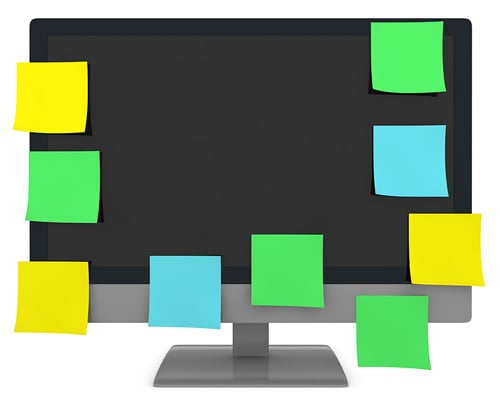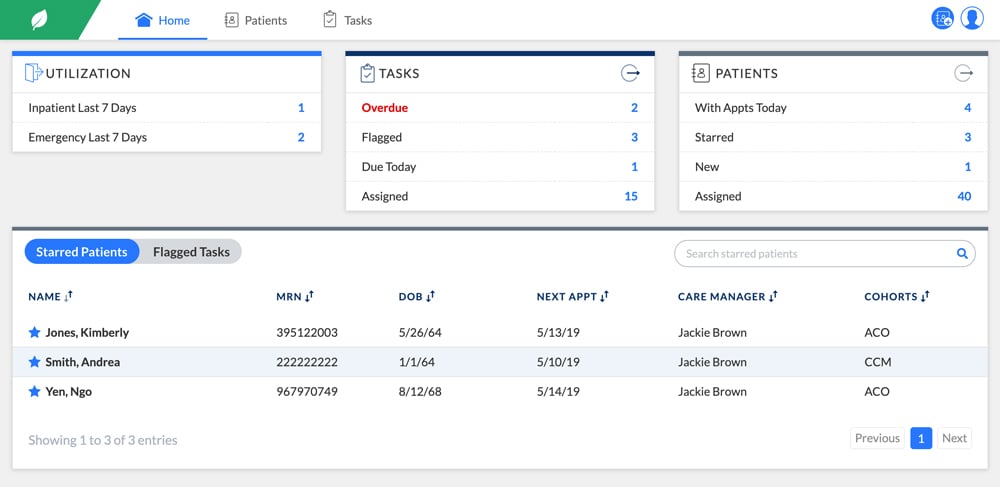Azara Care Management Begins to Transform Care Management and Care Coordination for Community Health Centers
Earlier this year, Azara Care Management (ACM) was made available for all Azara DRVS users. ACM is a separate product (not a module) that leverages the data within DRVS and requires a separate subscription beyond that of the DRVS application. This combination creates a powerful, patient-centric healthcare solution that benefits the entire community health center (CHC).
Inspiration for the product came about after witnessing many care/case managers, and care coordinators use various manual approaches to prioritize and manage patient follow up. Finding the right data across many systems and then reverting it to sticky notes and spreadsheets leaves room for error and takes an incredible amount of time. Additionally, most EHR systems do not have the view of the patient history and care plan that is truly needed to provide optimal care.
ACM leverages all of the clinical, claims, HIE, and practice management data in Azara DRVS. The ACM Clinical Passport provides an intuitive, synthesized view of data from the multiple sources, creating a comprehensive look at the patient’s treatment record, including care received at other facilities or providers. Teams organize patients into groups based on high cost, risk, or different characteristics like chronic disease and track day to day tasks and activities, leading to increased personal productivity and more timely, efficient, and effective patient care.
Bringing new products and modules to market takes the dedication of a few customers to pilot the solution in a live
CHC setting and provide feedback for modifications and enhancements. Two ACM pilot centers – Fordland Clinic
and NorthShore Health Centers – are now fully implemented and realizing the value of digitizing this critical patient care process.
Traditional care management challenges include identifying, tracking, and closing care gaps. Fordland Clinic use ACM to outreach to their diabetes patients and use one screen as a foundation to discuss blood pressure, blood glucose levels, and preventative screening, quickly capturing notes, and scheduling needed appointments.
Fordland also uses ACM to care for their hypertensive patients and to support their Patient-Centered Medical Home (PCMH) initiatives.
“We love the one-stop-shopping per se to pull up a patient’s information and know we are not missing a vital part of the care plan,” states Jamie Holden, Fordland Care and Community Health Coordinator. “Even better is the ability to access patients details when a care manager may be absent or on vacation. We don’t have to start the fifteen screen searching process again.”
According to an article in Health Catalyst, the right way to increase digitization will also increase the sense of humanity around healthcare to better address patient and clinician needs. This sense of humanity is prevalent in the way ACM can be used to foster better relationships with patients resulting in quality care and improved outcomes.
North Shore Health Centers in northwest Indiana could see how ACM would support their family health initiatives such as tracking social work for minors and pre and post-natal activities for mothers. Over 30 people at North Shore use ACM within care teams that include specialists in chronic care, prenatal, community health, behavioral health, family health, and a patient navigator. The full snapshot of a patient works wonders for their care management process for families with children under 2. The non-clinical, family health representative meets patients where they want – McDonald’s, at home, or at a community center for example – and uses a printed form of the ACM Passport to follow up on multiple items for the family and return to the office for follow up and assignments.
Patients become overwhelmed, especially when children are involved. ACM allows us to see who has touched a patient and make discussions about preventive health, guardianship, and Social Determinants of Health (SDOH) more organized and more successful.
- Alaina Albanese, North Shore Quality Improvement Manager
At North Shore, the care management team uses ACM for phone calls allowing them to focus less on tracking their time and more about where they are with moving the patient through a care plan.
“ACM helps us get the total picture of the patient, improves communications about the patient, and enables us to easily discuss the patient amongst the care team, including providers. Treatment is not missed or duplicated which can often happen if notes reside at the bottom of a lengthy EHR record,” Alaina added.
At Fordland, following a care plan within ACM has been game-changing for all.
“If a care plan for a heart failure patient includes weight loss, each goal such as exercise, diet, and sodium intake are three different care plans in our EHR. With ACM, there is one care snapshot for one patient even if there are multiple goals such as behavioral health,” shared Sonya Cass, Fordland Chief Nursing Officer. “Everyone gets the complete picture.”
And then there is the data. Health centers are finding that patient information is more accurate because clinical and care management are using the same tool. For reporting, UDS data is better validated and contains fewer errors – a win-win for center reporting efforts.
The possibilities are endless for health centers using ACM. Fordland is working on using the product for all of their chronic disease patients, including CHF, COPD, Chronic Pain, Diabetes, and Hypertension. Through the DRVS Care Transitions module for HIE integration, it is also possible to track emergency department visits for those receiving chronic disease care.
“ACM also can help us track a true referral meant to address any of the Social Determinants Of Health (SDOH). We keep this information outside of the clinical system, and now we can holistically see in ACM if items such as food insecurity are addressed as well,” added Alaina.
For health center operations, leaders can begin to understand the efficacy of interventions better, analyze empanelment and coverage, and improve interaction documentation for billing and proof of attempt. ACM also holds the team accountable in a positive, patient-centered way using a solution created to transform the care management and care coordination process.
AZARA Care Management Dashboard

